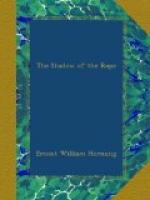This letter written, there was a small pile of them awaiting attention on top of the old bureau; and Langholm sat glancing at proofs and crumpling up press-cuttings until he needed a lamp. The letter that he kept to the last looked like one of the rare applications for his autograph which he was not too successful to welcome as straws showing the wind of popular approval. In opening the envelope, however, he noticed that it bore the Northborough postmark, also that the handwriting was that of an illiterate person, and his very surname misspelt. The contents were as follows:
“Northborough, August 18, 189—.
“MR. LANGHAM, Sir,
“I here as you
are on the tracks of them that murdered Alexander
Minchin, if you want
to know of them that had a Reason for doing it
I can give you the straight
Tip.
“I have been out to your place to-night, but you are only due home to-morrow night, therefore I will be your way again to-morrow night, but will only come to the cross-roads as your old girl look suspichious last night and this is on the strickt Q.T.
“Till to-morrow
night then at the cross-roads near your place, from
nine to ten to-morrow
night, when you will here of something to
your advantage.
“Believe your’s faithly,
“JOHN WILLIAM ABEL.”
Langholm could not guess who this man Abel might be, but idly imagined him one of the innumerable drinking drones who stood about the street corners of Northborough from morning till night throughout the year. This one had more information than the common run, with perhaps more cunning and ingenuity to boot. Langholm deemed it discreet not to mention the matter to his dear “old girl” of disrespectful reference, who served him an excellent supper at eight o’clock. And little better than an hour later, having seen the invalid once more, and left him calm and comfortable for the night, the novelist sallied forth to meet his unknown correspondent.
It was a dark night, for the rain was by no means over, though not actually falling at the moment; and the cross-roads, which lay low, with trees in all four angles, was a dark spot at full moon. As he approached with caution, rapping the road with his stick in order to steer clear of the ditch, Langholm wished he had come on his bicycle, for the sake of the light he might have had from its lamp; but a light there was, ready waiting for him, though a very small and feeble one; for his illiterate correspondent was on the ground before him, with a cutty-pipe in full blast.
“Name of Langholm?” said a rather rollicking voice, with a rank puff and a shower of sparks, as the cautious steps followed the rapping stick.
“That’s it,” said Langholm; “if yours is Abel, I have got your letter.”
“You have, have you?” cried the other, with the same jovial familiarity. “And what do you think of it?”




